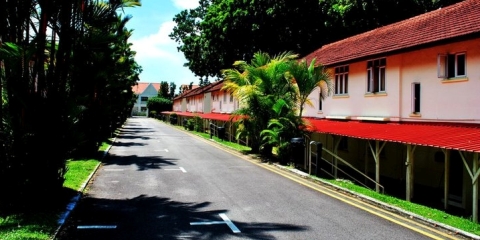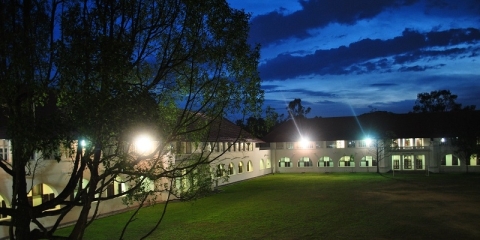留学生だより
湯淺令子(to LKY)
2010年8月から2011年5月までの二学期間、National University of Singapore, Lee Kuan Yew School of Public Policyに、東京大学とのダブル・ディグリー候補生として留学した。
留学の目的は大きく分けて二つあった。まず、日本を外から見ることで、日本に対する自分の思いを確認したかったこと。日本の文化や歴史、経済や政治について、他国の人、特に他国の政府で働いている人がどのように見ているのかを知りたいという思いを持っていた。二つ目として、英語でアカデミックな議論ができる力、多様なバックグラウンドを持つ人を説得できる力が欲しかったこと。以前オーストラリアに住んでいたため英語の発音や会話力には自信があったが、将来英語をスキルとして使うためには、日常会話に長けているのみではなく、英語で十分に議論をして相手を動かす力が必要だと考えた。
留学先としてシンガポールを選んだ理由は、まずシンガポールの政策を知りたかったことが挙げられる。シンガポールは天然資源が少なく人材や科学技術が資源であることなど日本と似ている点が多く、海外からの人材集めの政策などを学べるのではないか考えた。実際にはシンガポールには農業がほとんどなく通商政策において農業自由化が問題となっていないこと、一党により効率よく政権が運営されているが民主主義とはいえないであろうことなど、シンガポールと日本はコンテクストが大きく異なる国なのだという認識を今では持っている。それでも、シンガポールの政策を知ることによって日本の政策と比較することができるようになったことは大きな収穫である。また、中国語を学びたかったことも、留学先としてシンガポールを選んだ理由の一つである。大学で第二外国語として学んだ中国語を、学生の間に会話レベルにまで高めたいと考えていた。Lee Kuan Yew School of Public Policyでの授業とは別に中国語の授業を受講したことや、中国人の友人が多数できたことに加え、シンガポールでは中国語で話しかけられることが多く、否応なく中国語のリスニング力とスピーキング力が上がった。
授業に関しては、ダブル・ディグリーの修了要件により必修科目が多く、選択できる授業の自由度は低かったが、Lee Kuan Yew School of Public Policyで提供されている選択授業はシンガポールという立地を生かしたものが多く非常に興味深かった。特に面白かったのは、Politics and Policies in Southeast AsiaとSecurity in Asia-Pacificの二つである。Politics and Policies in Southeast Asiaでは、インドネシア、マレーシア、フィリピン、ミャンマー、タイ、シンガポール、ベトナムの第二次世界大戦後の歴史と現在の政治体制や抱える問題等について、社会学的制度論、歴史的制度論の観点から学習した。東南アジアの国々の政治について詳しく学んだことで、現在の各国の状況に対する理解が深まるとともに、現地を実際に訪れたときにも関心が広がった。Security in Asia-Pacificでは、北朝鮮の核問題、台湾・中華人民共和国の両岸関係、南シナ海の領土問題という三つの東アジアにおける安全保障問題について学習した。どの問題に関しても教授はアメリカと中国双方の見方に詳しく、日本で日本の政策決定者から学んだ時とは違った観点から学ぶことができた。東南アジアの政治については前提知識を持っていなかったため、どの授業も新しく学ぶことばかりだったが、東アジアの安全保障については多少日本で学んだことがあったため、教授の意見とこれまで耳にした意見との相違や、他国の生徒との討論が新鮮だった。
一方必修科目としては、マクロ経済とミクロ経済の他に、政策分析の方法論をいくつか受講した。そのうちの一つ、Policy Research Design and Methodologyでは、Experimental DesignsやField Research Techniquesなどを学んだ。最も大きな課題は、Singapore Indian Development Associationという実際に存在する機関と連携し、あるプログラムの評価方法を考えるというものであり、学んだ方法論を応用することができ有用だった。これら方法論に関する授業は東京大学では提供が少なく、政策分析の方法論の概要を包括的に学べたことは、今回の留学の成果の一つである。
必修授業・選択授業ともにインタラクティブな授業が多く、participationが最終成績の50%を占める授業もあった。最初は慣れずに苦労したが、毎回の授業で一度は発言することを目標にし、積極的に発言することに徐々に慣れていった。

Lee Kuan Yew School of Public Policyで共に学ぶクラスメートは、非常に多様であった。多くは東南アジア、インド、中国の政府や政府関連機関から派遣されており、彼らと気軽に話をし、スポーツなどのアクティビティを行うというのは非常に貴重な経験であった。日本から留学している政策決定者や日本のメディアで働いている人からも話を聞く機会があり、今後の進路を考えるうえで役立った。
最後に、シンガポールという立地と格安航空会社を利用し、週末や長期休みを利用して積極的に友人と、時には一人で東南アジアを旅行した。全ての国を訪れることはできなかったが、東南アジアの様々な国の文化の違いや発展段階の違いを肌で感じることができたうえ、東南アジアの政治や歴史、政策など授業で学んだことを各国の発展段階や国民性と結びつけて考えることができた。また、共に旅行したことは他国の友人を深く知る機会となるとともに、東南アジア各国に対する他国の人のもつ印象や考えを知るきっかけとなり、自分の国に良い印象を持ってもらうためには、また良い意味でのプレゼンスを示すためにはどのような方法があるか考えるうえでの助けとなった。

I studied at National University of Singapore, Lee Kuan Yew School of Public Policy as a Double-Degree candidate from August 2010 until May 2011.
I had two goals in my mind when I started the one year. My first aim was to think about my feeling towards Japan and my identity as a Japanese by looking at the country from outside. I wanted to know how people outside Japan, especially government officials from other countries, are looking at Japanese culture, history, politics, policies, and economy. My second aim was to improve my English skill to participate in academic discussions and persuade people from other countries in English. Conversation skill is not sufficient to argue and convince someone in English.
There were two reasons why I chose Singapore to study abroad. First, I was interested in Singapore's policies. Since Singapore has scarce natural resources and put emphasis on developing human resources, I first thought that Singapore and Japan have many things in common, and that I could learn many policies from Singapore to implement in Japan. In fact, I now realize that Singapore and Japan are very different countries. For example, Singapore did not have difficulty opening up as a trade-focused country as it did not have large agriculture sector, which is totally different from the situation in Japan. Still, learning about Singapore's policies enabled me to compare them with Japan's policies and think about Japan's policies from a different perspective. Second, I wanted to improve my Chinese, which I learned in university before for a year. Since local people in Singapore most of the time spoke to me in Chinese, my Chinese listening and speaking skills highly improved.
Among the classes I took in LKY, “Politics and Policies in Southeast Asia” and “Security in Asia-Pacific” were the most interesting. In “Politics and Policies in Southeast Asia”, we learned and discussed histories after WWII, political regime and policies, and current issues, of Malaysia, Indonesia, the Philippines, Myanmar, Thailand, Vietnam, and Singapore. Learning about Southeast Asia's politics and policies let me understand deeper about the current situations in the region, and also made visiting the countries much more interesting.
North Korea's nuclear issue, the relationship between PRC and Taiwan, and territory issue in the South China Sea were the topics covered in “Security in Asia-Pacific”. The professor was close to both Chinese and American policy makers and had information from both sides, and I learnt different perspectives from the perspectives I learnt in Japan.
I also took a few methodology classes, such as “Policy Research Design and Methodology”. Experimental Designs and Field Research Techniques were some of the things taught in that class. The biggest assignment for that class was to develop a program evaluation scheme for an actual program conducted by an existing organization “Singapore Indian Development Association”. This assignment made students apply the methods leant in the class to the real world and was useful.
Most of the classes were interactive. In fact, in one class, 50% of the final grade was “participation”. Although at first I first could not get used to the style, I made it a requirement for myself to speak out at least once at each class, and gradually got familiar to actively say my opinion or questions in classes.
Classmates I studied together at Lee Kuan Yew School of Public Policy were very diverse. Most of them were working for government or government related organizations in Southeast Asia, China, and India. It was a precious experience to get to know them personally by casually talking with them and by doing school activities.
Lastly, Singapore was a perfectly suitable place as a base to travel around Southeast Asia. I traveled many times around the region on weekends and holidays by budget airlines. Although I could not visit all the countries in Southeast Asia, I travelled to many places and could feel the differences of culture, national characters, and level of development. Furthermore, histories, politics, and policies I leant in a class enabled me to relate those factors to the differences of each country. In addition, travelling with friends from different countries was a good opportunity not only for knowing my friends well but also to know what images and thoughts my friends were having on countries in Southeast Asia, which became a help to think about what can be done to make people have good impression on my country.

